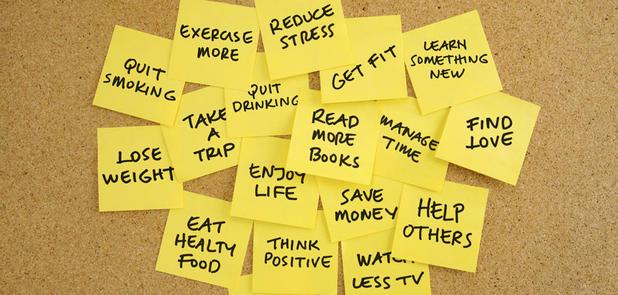New Year's Resolutions for Stress and Weight Management

Now that the holiday season has ended, many of us will begin focusing on New Year’s resolutions. Weight loss consistently ranks as one of the most popular resolutions, along with other weight-related goals like drinking less alcohol, eating healthier foods and getting fit. However, the financial burden, emotional toll and fatigue left in the wake of the holiday season makes January one of the most stressful months of the year and stress can be a major road block in achieving goals, particularly weight loss.
The mind connection
When people are stressed, they often eat foods high in calories, fat, sugar and/or salt as a means of comfort; in fact, nearly 50 percent of Americans claim to be stress eaters. Results from a study released in June 2013 from the University of California, Davis and the U.S. Department of Agriculture’s Western Human Nutrition Research Center found that stress lowers our ability to make wise decisions that consider short-term gratification against longer-term consequences. And while educating people in healthy food choices and portion sizes is helpful, it is also very important for people to learn how to manage their stress, make good decisions in stressful situations and employ effective stress management shortcuts.
The body connection
There is also a physiological link between stress and weight gain. Whether stress is the result of a traffic jam or a concerning medical diagnosis, it signals the hypothalamus to release hormones to help your body adapt to and handle the stressor; one being cortisol. When you are stressed, your body requires more energy; therefore, cortisol triggers sugar that is stored in the liver and muscles to enter into the blood. This is why people with diabetes often need to additional medication during stressful situations and should try stress management techniques.
Cortisol also converts fat and carbohydrates for energy. To replace the calories burned while stressed, it stimulates your appetite. After the stress subsides, your body continues releasing cortisol, often leading to overeating and weight gain around the abdomen, which is a risk factor for cardiovascular disease.
Resolutions to make
Meditate on a daily basis, even if it is only for five minutes. Mediation is credited with lowering stress, blood pressure and respiration and heart rates while also improving insulin sensitivity, nervous system function and muscle relaxation. You can take a traditional approach to meditating by sitting in a dim, comfortable, quiet environment and breathing deeply while releasing your thoughts or you can incorporate meditation into activities like yoga and Tai Chi.
Strengthen Your Willpower
A strong sense of will can help you overcome some of the pitfalls of stress and help you make better food choices. Three easy ways you can work on your willpower include:
- Start and finish a puzzle (jigsaw or word) that is tough to solve.
- Watch a funny television show, but resist the urge to laugh.
- Watch a sad movie, but resist the urge to cry.
Schedule Downtime
Jamming your calendar with deadlines and activities causes stress and often poor food choices. Schedule down time just like you would an appointment and give yourself some time to rest and unwind.
Eat More Plant-Based Food
Experts suggest incorporating more plant-based foods like vegetables, whole grains and tofu, into your diet as they seem to help with weight management. Continue reading for a handful of easy nutrition-oriented resolutions.
When faced with a willpower challenge, drink a glass of orange juice. Experts believe that sugar in orange juice helps the cerebral cortex section of your brain promote self-control. Remember to refer to MDVIP Connect to access recipes, shopping lists and menus that focus on weight loss. Continue reading for more tips on setting and maintaining your New Year's resolutions.
